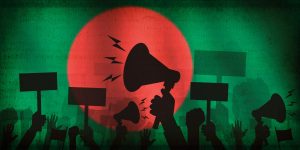In 1936, The Literary Digest conducted the largest political poll in history. Mailing and phoning millions of Americans, it gathered more than 2 million responses and confidently predicted Franklin Roosevelt’s defeat in the presidential election that year.
The result? Roosevelt went on to win in a historic landslide.
The Literary Digest’s mistake was simple: it asked the wrong people. Its sample of telephone and car owners skewed wealthy and Republican, producing a confident but catastrophically wrong prediction. The fiasco became the most famous polling blunder in modern history – and a reminder that size of a sample cannot fix bias.
Bangladesh now risks its own version of that lesson. And this time, the consequences extend far beyond Dhaka. With Bangladesh’s election under global scrutiny – watched closely in Washington, New Delhi, Beijing, and Brussels – flawed polls risk misleading not only citizens at home, but also the international community assessing the country’s political future.
Earlier this month, the BRAC Institute of Governance and Development (BIGD) released a national survey on the upcoming elections. With more than 5,400 phone interviews across all districts, the study grabbed headlines by reporting citizen attitudes on party preference, election timing, and perceptions of fairness.
In a country awash with speculation and disinformation, BIGD deserves credit for attempting to inject evidence into public debate. But courage is not the same as credibility.
BIGD’s sample leaned heavily rural: 73 percent of respondents, compared to a far more urbanized national population. The institute has not disclosed whether it corrected this imbalance with statistical weighting, nor how its phone numbers were drawn – random digit dialing, subscriber lists, or otherwise. This matters. In Bangladesh, access to phones varies sharply by income, gender, and geography. Wealthier, urban men are more reachable than poorer, rural women. Without methodological transparency, it is impossible to know whether BIGD’s respondents reflect the electorate or simply a skewed slice of it.
The Literary Digest failed because its frame excluded millions of poorer Americans. BIGD risks a similar outcome by overrepresenting citizens easiest to reach by phone – a bias that could distort perceptions of electoral strength at a critical moment.
The larger problem is not who answered, but who refused. Nearly half of respondents told BIGD they were undecided. Another 14 percent declined to answer altogether, and 1.7 percent said they would not vote. That leaves roughly a third of respondents forming the basis for the party preferences that generated headlines.
In survey methodology, this is a flashing red light. Political silence is rarely neutral. In Bangladesh’s tense political climate, it is likely that the most cautious or vulnerable citizens – those fearful of reprisal or skeptical of confidentiality – withheld their views. That means BIGD’s reported partisan breakdowns are built on a thin and potentially unrepresentative foundation.
For diplomats, donors, and international observers trying to interpret Bangladesh’s trajectory, this silence is telling. The survey says less about who is popular, and more about who feels safe enough to speak.
BIGD reported vote shares as exact percentages, yet offered no margins of error, standard errors, or design effects. Without them, readers cannot judge the stability of the findings. In an environment where two-thirds of citizens are silent, even small differences in assumptions could swing reported support for one party or another. Presenting fragile numbers as authoritative is misleading, and risks distorting rather than clarifying the public conversation.
This is the trap of precision without accuracy. The Literary Digest fell into it in 1936, projecting false confidence from flawed data. BIGD, wittingly or not, risks doing the same – with implications that reach well beyond Bangladesh’s borders.
Not all is lost. BIGD’s broader questions – on optimism, trust in institutions, and perceptions of electoral fairness – are less sensitive than partisan choice and may capture genuine attitudes more reliably. Tracking those over time could help illuminate shifts in public sentiment. Conducting a national survey in Bangladesh is itself no small achievement, and BIGD should be commended for attempting it.
But ambition must be matched by rigor. For surveys to serve the public good, they must be transparent about their design and candid about their limits. That means publishing sampling procedures, weighting strategies, call outcomes, and uncertainty margins. It also means acknowledging that when two-thirds of respondents decline to reveal their political preference, any vote-share figures must be read with extreme caution.
The Literary Digest never recovered from its 1936 humiliation. George Gallup, with a fraction of the sample but a scientifically designed method, got the election right and established modern polling. BIGD now stands at a similar crossroads.
Bangladesh is no ordinary case. It is the world’s eighth-most populous country, a linchpin for stability in the Bay of Bengal, and an arena of competition for India, China, and Western democracies. The credibility of its next election will shape not only domestic legitimacy, but also how external partners engage with Dhaka on trade, security, and human rights.
Bangladesh needs independent, credible surveys that illuminate rather than obscure public opinion. BIGD has the resources and reputation to deliver them. But unless it strengthens its methods and practices greater humility in reporting, its surveys risk being remembered not as breakthroughs, but as cautionary tales.
Numbers shape narratives. And in South Asia’s next election, when the numbers are wrong, the narratives can mislead not only Bangladeshis, but the world.
Researchers from BIGD responded to the concerns raised in this op-ed in a separate article.

































